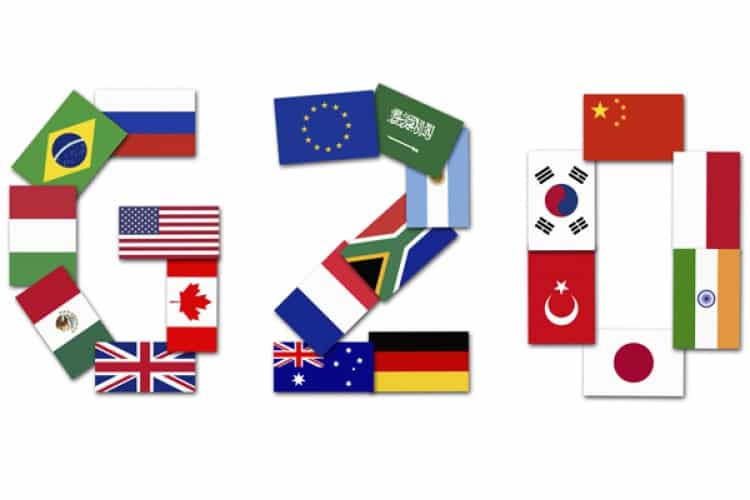Introduction and History
- Its full form is Group of Twenty.
- Founded in year 1999, its main aim was to analyze, reassess, canvass and encourage high-level open discussion of policy issues concerning the international financial stability.
- It was initially started as a meeting of Finance Ministers and Central Bank Governors in the backwash of the Asian financial crisis.
- Its purpose is to bring together systemically important industrialized and developing economies to discuss key issues in the global economy.
- An international assembly incorporating 20 major economies’ governments and central bank governors.
- Its members include 19 individual countries and the European Union.
- These 20 major economies collectively account for:
→85% of the gross world product (GWP)
→80% of world trade
→Two-third of the world population - One of the additional major goal of G20 forum is to take under concerns the issues that go beyond the responsibilities of any organizations or institutes acting whether at national or international level.
- The inaugural meeting was held in 1999, in Berlin, Germany.
- The leaders of these economy meet for a discussion annually whereas meeting of Finance Ministers and Central Bank Governors are held regularly.
- G20 was founded keeping in mind an international coordination of economic policy with major economic organizations such as World Trade Organization, Financial Stability Board, International Labour Organization, and United Nations.
- G20 superseded G33 and was formally established on 26 September, 1999.
- The G20 group was proposed to replace the G8 group comprising the main economic council of wealthy nations because of its growing stature in world.
- After the collapse of Lehman Brothers first leaders’ summit was held in year 2008.
- The G20 Summit continues to focus on measures to support global economic growth, with a strong emphasis on promoting job creation and open trade.
List of Summits
- First Summit was held in 2008 in the United States
- China hosted the summit in 2016.
- The 2017 summit will be hosted by Germany
Importance of G20
- Whether one believes or not but G20 continues to aim on measures to support global economic growth and stability and has played a paramount role in promotion and emanation of job creation and open trade.
- Before the inception of G20, the economies of G7 and G8 held a major power in the world as far as the global economy was concerned. The G20 is much more representative of such thing in the present era we live.
- One of the good things about G20 is that it not only is a platform for discussing finance but also emerging topics like climate change, terrorism etc.
India and G20-2016 summit
- The 11th summit for head of the state or government was held on 4-5 September in Hangzhou, China.
- The official theme of the summit was “Building an innovation, invigorated, interconnected and inclusive world economy.”
- The main concerns brought up were:
→Fight against tax evasion (asking the Organisation for Economic Co-operation and Development for a black list of tax havens).
→Favour international trade and investments and opposition to protectionism.
→Fiscal stimulus and innovation to boost economic growth.
→Combating “populist attacks” against globalisation.
→Strengthen support for refugees. - Narendra Modi has announced a $500 million defense support to Vietnam sending China a strong message that India is no behind creating influence in South and East Asia.
- India’s main concerns were to extenuate terrorism and black money. Narendra Modi raised objections against Pakistan and China without explicitly naming them.
- Indian Prime Minister also had a bilateral talk with the leaders of nations like Australia, Saudi Arabia, Brazil, South Africa, and USA to raise his concerns on global economic stability.
- Both USA and China have finally acquiesced to ratifying the Paris Accord that stipulates nations to reduce carbon emissions and aims to end fossil fuel subsidies.
- India has 7 per cent growth rate, the highest in the world at present, and wants to expand its manufacturing in a big way and therefore is opposing the deadline of the agreement.
- One of the major outcome of the summit was seeing Sino-India relations on a good terms once again as after a freeze in relation some time ago impeded the investments of China in India.
Criticism and future with G-20
- First and foremost criticism to G-20 lies in its membership legitimacy. The nations which are not members despite having powerful, stable and large economies have raised and objected G-20s legitimacy over this issue.
- Concerns have also been raised about G-20 being scintillating from outer appearance but dull and gloomy from its internal structure and functioning.
- Norway has also explicitly condemned the functioning of G-20 stating that although it is an expansion of G7 or G8 which is a good thing only in a certain way but it is not 19th century where only self-appointed nations will lead.
- Poland has reprimanded G-20 asking for membership again and again stating if G20 is about the largest 20 economies then why Poland despite having 18th largest economy is not in the group.
- G-20 also lack an independent and formal charter and therefore time to time there has been a demand to emanation of a council independently working from any influence like an Economic Security Council in UN.
- Albeit G20 faces several criticism from major and powerful economies no one can still deny the fact it incorporates the most powerful countries not only in terms of economy but in other matters also.
- It is in the hands of these leaders that represent these economies to not only strengthen their nations but also seek this as an opportunity for international financial stability with coordination from each other.











